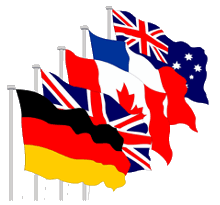Imprint
• Data Protection / Privacy Shield
• Click the flag for German version
![]()
The Search Engine for Flags
 The
Flag-Finder
The
Flag-Finder
The Flag-Finder offers the option to attribute a once seen flag easily and quickly. Search, identify and find your flag! The Flag-Finder contains more than 3.500 images of flags from all officially recognized countries of the world, from secessionist areas, as well as historic flags, flags of many provincial or territorial sub-territories, flags of nations, colonies, the special flags of the states and territories, such as merchant and marine flags (ensigns) or flags of the heads of state.
Flags and Banners of the World
The Flag-Finder will help you to search and to identify a flag that you have seen somewhere. It works as a filter. You just have to know the characteristics of the flag which you are looking for. Click simply through the Flag-Finder, and exclude or confirm these characteristics. The search will be supported during the process by simple pattern flags, they give some guidance.
With the connected Flag and State Encyclopedia you will find background-informations about the to the flag belonging countries, states or territories, and further informations about their Coat of Arms (Heraldry), Flags (Vexillology), Geography and History.
Start
For an alphabetical search, please click here.
Find out something about making flags:
Flags can be a mass product, as we know from sporting events or
demonstrations. Such high numbers of flags can only be produced by screen
printing. This means that the colour is pressed through a sieve into the
flag material, which contains additionally some images, in a pretty fast
machine. The advantage is a low unit costs in large jobs, and of course
the possibility to use true colors. The color reproduction is thus not
generated by the combined printing of cyan, magenta, yellow and black,
but it come to use the pure and genuine colours. The color pigments
remain homogeneous, become not mixed, what brings a clear and optically
pure colour impression
In small quantities become flags, for cost reasons,
printed digitally. The image is applied without an intermediate
stage (such as screen-sieves) in the overprint of cyan, magenta, yellow and
black, directly on the bunting. The color penetrates the bunting and becomes
then fixed yet. That makes colourfast. Digital printing is
not inexpensive, but the price is okay in the case ofsmall numbers.
What kinds of bunting are there? Basically are two types of bunting are used
for flags: light glossy polyester or tough ship-flag
polyester. Here is a comparison of these two types =>
click here
What matters is if the flag should be a stick flag,
then it would get a hemstitch to slide onto the flagpole, or it has to
be a flag for hoist. For hoisting flags
is sutured a solid braid (mostly white) at the leech which absorbs the
forces acting on the suspension of the flag. To hoist is one thing, the
way of hoisting the other. There are different kinds of processing:
With carbines in plastic or in metal, with metal
eyelets (brass) in the braid, or cord and cord
loop in the braid. You should think before exactly which option you choose,
or which variant the suspension the flagpole in front of the house permits.
Here you can find informations about making flags in low numbers =>
click here
